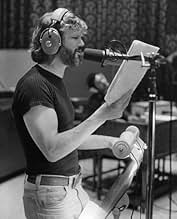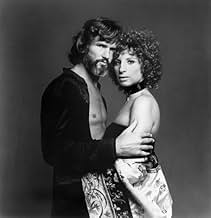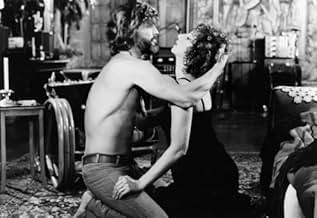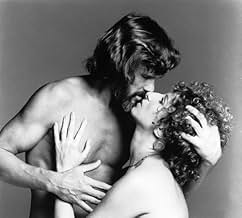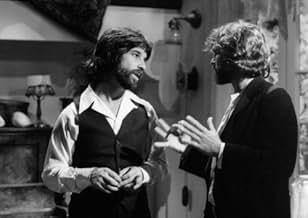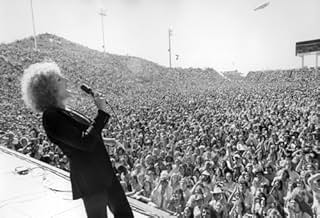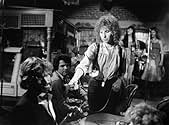Has-been singing idol John Norman Howard falls in love with young, up-and-coming songstress Esther Hoffman in Frank Pierson's version of the classic love story updated to the rock and roll e... Read allHas-been singing idol John Norman Howard falls in love with young, up-and-coming songstress Esther Hoffman in Frank Pierson's version of the classic love story updated to the rock and roll era.Has-been singing idol John Norman Howard falls in love with young, up-and-coming songstress Esther Hoffman in Frank Pierson's version of the classic love story updated to the rock and roll era.
- Won 1 Oscar
- 7 wins & 7 nominations total
Sammy Lee Creason
- The Speedway
- (as Sam Creason)
Storyline
Did you know
- TriviaKris Kristofferson said, "Filming with Barbra Streisand is an experience which may have cured me of the movies."
- GoofsAfter John Norman crashes his motorcycle, and Esther runs to him, there are dirty hand prints on the back of her blouse before John Norman pulls her down in the dirt and puts his hands on her back.
- Quotes
Esther Hoffman: You can trash your life but you're not going to trash mine.
- Crazy creditsMs. Streisand's clothes from ... Her Closet.
- Alternate versionsStreisand interpolated previously unused footage for the film's 2018 release on Netflix. Original footage restored a guitar version of "Evergreen" previously cut to condense the film. The finale "With One More Look at You/Watch Closely Now" was re-edit from a single take to a more enhanced visual.
- ConnectionsEdited into Barbra Streisand: Woman in Love (1981)
Featured review
I was fully expecting to dislike this version of A Star Is Born, since I'd already seen the 1954 version and loved it. I'd also already seen the 1937 original, and while it wasn't as good as the remake, I still appreciated it. My mom said she couldn't stand the 1976 version, and we usually have pretty similar taste, especially when it comes to musicals. Surprise, surprise, I loved it.
The reason I was able to enjoy A Star Is Born so much is because I pretended it was a completely different movie. If you've seen either of the two earlier versions and expect a traditional remake, you'll probably hate it. John Gregory Dunne, Joan Didion, and Frank Pierson may have based their concept on a previous story, but they've written a completely different script. So, for the purpose of telling you my thoughts on the film, I won't compare it at all to the Judy Garland version.
Kris Kristofferson might be the only person in the world who can pull off a bearded, '70s look while still coming across as hygienic. It doesn't make sense that I think he's wildly attractive, since I usually hate that look, but I was in heaven with the amount of eye candy in this movie. Perfectly cast as a popular rock star, he starts the movie past his peak. He drinks, snorts cocaine, forgets his lyrics onstage, and performs outrageous, life-threatening stunts. He chances upon Barbra Streisand singing in a nightclub and is so impressed with her talent, he propels her to stardom. And of course, they fall in love.
I really am surprised by how much I liked this movie, since so much of it isn't usually my cup of tea. The 1970s isn't my favorite decade, and I usually find the clothes and hairstyles irritating. With exception to two of the plentiful songs in the movie, I didn't really like the music. Barbra Streisand's character has plenty of bite to her, which I don't usually find sympathetic. Somehow, putting all the elements together worked beautifully. Somehow, it made total sense that Barbra gave Kris attitude when they were first getting to know each other. I won't be buying the soundtrack, but Barbra's vocal talent was extremely impressive; it was very understandable that audiences in the film were wowed by her.
Both leads put their whole hearts into their performances, and even though this was the third time I'd seen the story, I still cried during each of their "big scenes". If you know the story, you know which ones they are. I'd always thought of Kris as just a good-looking singer, but I was surprised by how much dramatics he poured into his scenes. Barbra is always a good performer, and in her romantic one-on-one scenes, she's tender and vulnerable. She's been paired up with a very long list of good-looking leading men-Robert Redford, Ryan O'Neal, Jeff Bridges, Omar Sharif, Nick Nolte, and young Mandy Patinkin-and I've never seen her with greater, sweeter, lovelier chemistry than with Kris Kristofferson. The way they look at each other is so beautiful, like how Jack Carson looked at Doris Day in Romance on the High Seas. If you like the Oscar-winning song "Evergreen", you'll love the scene in the movie when they sing it together.
My advice is to either watch this version first or forget you've seen any other version when you rent it. He's gorgeous, she's in her perm-prime, and if you like '70s rock, you'll really love it.
The reason I was able to enjoy A Star Is Born so much is because I pretended it was a completely different movie. If you've seen either of the two earlier versions and expect a traditional remake, you'll probably hate it. John Gregory Dunne, Joan Didion, and Frank Pierson may have based their concept on a previous story, but they've written a completely different script. So, for the purpose of telling you my thoughts on the film, I won't compare it at all to the Judy Garland version.
Kris Kristofferson might be the only person in the world who can pull off a bearded, '70s look while still coming across as hygienic. It doesn't make sense that I think he's wildly attractive, since I usually hate that look, but I was in heaven with the amount of eye candy in this movie. Perfectly cast as a popular rock star, he starts the movie past his peak. He drinks, snorts cocaine, forgets his lyrics onstage, and performs outrageous, life-threatening stunts. He chances upon Barbra Streisand singing in a nightclub and is so impressed with her talent, he propels her to stardom. And of course, they fall in love.
I really am surprised by how much I liked this movie, since so much of it isn't usually my cup of tea. The 1970s isn't my favorite decade, and I usually find the clothes and hairstyles irritating. With exception to two of the plentiful songs in the movie, I didn't really like the music. Barbra Streisand's character has plenty of bite to her, which I don't usually find sympathetic. Somehow, putting all the elements together worked beautifully. Somehow, it made total sense that Barbra gave Kris attitude when they were first getting to know each other. I won't be buying the soundtrack, but Barbra's vocal talent was extremely impressive; it was very understandable that audiences in the film were wowed by her.
Both leads put their whole hearts into their performances, and even though this was the third time I'd seen the story, I still cried during each of their "big scenes". If you know the story, you know which ones they are. I'd always thought of Kris as just a good-looking singer, but I was surprised by how much dramatics he poured into his scenes. Barbra is always a good performer, and in her romantic one-on-one scenes, she's tender and vulnerable. She's been paired up with a very long list of good-looking leading men-Robert Redford, Ryan O'Neal, Jeff Bridges, Omar Sharif, Nick Nolte, and young Mandy Patinkin-and I've never seen her with greater, sweeter, lovelier chemistry than with Kris Kristofferson. The way they look at each other is so beautiful, like how Jack Carson looked at Doris Day in Romance on the High Seas. If you like the Oscar-winning song "Evergreen", you'll love the scene in the movie when they sing it together.
My advice is to either watch this version first or forget you've seen any other version when you rent it. He's gorgeous, she's in her perm-prime, and if you like '70s rock, you'll really love it.
- HotToastyRag
- Jun 16, 2018
- Permalink
- How long is A Star Is Born?Powered by Alexa
Details
- Release date
- Country of origin
- Language
- Also known as
- Nace una estrella
- Filming locations
- Empire Ranch, Sonoita, Arizona, USA(newly built honeymoon home)
- Production companies
- See more company credits at IMDbPro
Box office
- Budget
- $6,000,000 (estimated)
- Gross US & Canada
- $80,000,000
- Gross worldwide
- $80,000,115
- Runtime2 hours 19 minutes
- Sound mix
- Aspect ratio
- 1.85 : 1
Contribute to this page
Suggest an edit or add missing content






